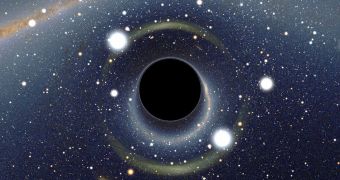Our understanding of how black holes work from a physics perspective holds that these objects should be capable of accelerating particles at much higher energies than equipment built here on Earth ever could. Now, investigators are looking into methods of making this a reality.
The international collaboration of researchers involved in this research says that the amount of acceleration particles get in the Large hadron Collider (LHC), the largest, most powerful accelerator on Earth, is negligible in comparison to how one of the dark behemoths would influence particles.
The European Organization for Nuclear Research (CERN) operates the 27-kilometer LHC, which is the longest ever built, and capable of reaching a combined energy level of 14 teraelectronvolts (TeV).
These energy levels are nothing when compared to what a black hole can do. In fact, even if we turn our solar system into a particle accelerator, we wouldn't come even close to what the black hole in an active galactic nucleus (AGN) could do.
However, there is a problem with using the dark behemoths as science devices – we cannot control all the parameters in the experiments. In fact, there are thousands of experiments going on at the same time, and it would be close to impossible to isolate the signal we're looking for.
At the same time, the supermassive objects have the tendency to consume the byproducts particle acceleration experiments would produce. On the other hand, using computer models and simulation, it is possible to predict the outcome of particle collisions around black holes.
Existing orbital and ground-based infrastructure could then be used to scan the objects' surroundings for these signals, without incurring any costs for developing the telescopes and detectors further, Daily Galaxy reports.
The collision of two dark matter particles would naturally produce a different signal than the collision of two lead nuclei, or of two hydrogen or helium atoms. When experts learn to distinguish between signals, they will be able to conduct surveys of black holes.
However, this will only become possible in the future, when our understanding of particle physics is improved by experiments such as the LHC, which physicists plan to use as a springboard for other investigations.

 14 DAY TRIAL //
14 DAY TRIAL //